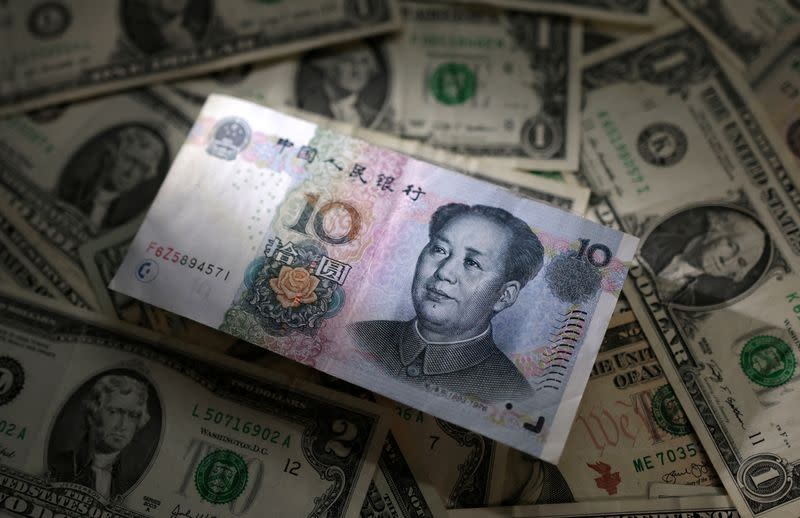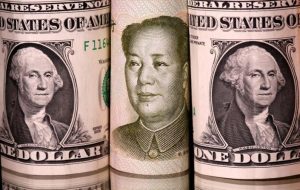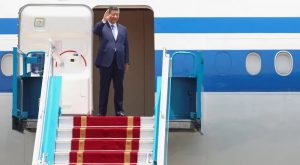China is now paying for nearly all its purchases of fuel and even some metals from Russia in yuan instead of dollars, multiple trading executives with direct knowledge of the matter have said.
The world’s second largest economy has dramatically increased the use of its currency, in the wake of the Ukraine war, for much of a roughly $88 billion Russian commodities trade.
The moves aim to accelerate efforts to internationalise the yuan, at the expense of the dollar. However, strict capital controls are expected to limit the currency’s global role in the near term.
Also on AF: China’s Moves to Boost Use of The Yuan Starting to Pay Off
In March, the yuan – also known as the renminbi – became the most widely-used currency for cross-border transactions in China, overtaking the dollar for the first time, official data showed.
But its share as a global payments currency remains small, at 2.5%, according to SWIFT, compared with 39.4% for the dollar and 35.8% for the euro.
Chi Lo, senior investment strategist at BNP Paribas Asset Management in Hong Kong, predicts a long-term “snowball effect” as more countries join the “RMB bloc” to reduce risks of dollar exposure, “especially after they’ve seen what the US-led sanctions against Russia have done,” he said.
“This is a very long-term development stretching into the coming one or two, even three decades,” he said.
“For now, and for the foreseeable next few years, I think the trade using RMB will predominantly be used for commodity and energy trade.”
Ukraine war turning point
While Beijing has been pushing to internationalise the yuan for over a decade, the currency had only been used sporadically in big Chinese commodities purchases. Its biggest hurdle remained that most global trading of oil, gas, copper and coal is priced off dollar-based benchmarks.
That began changing last year as western buyers shunned purchases of Russian goods in the face of mounting sanctions following Moscow’s invasion of Ukraine. Chinese buyers stepped in to snap up discounted crude oil, coal and aluminium, boosting 2022 commodities imports from Moscow by 52% in value terms.
That helped save China billions of dollars as its economy reeled from Covid lockdowns, with purchases poised to grow this year as China’s economy recovers.
Total settlements on Cross-Border Interbank Payment System (CIPS), China’s alternative to the SWIFT international payment system, rose 21.5% year-on-year to 96.7 trillion yuan ($14.02 trillion) in 2022, Chinese central bank data showed.
Nearly all of China’s oil imports from Russia, mostly crude but also smaller volumes of fuel oil, are now settled in yuan, five trading executives with direct knowledge of the matter said. China imported a combined $60.3 billion worth of crude oil and fuel oil from Russia last year, according to Chinese customs.
Western sanctions add impetus
Globally, yuan use has been gaining momentum. Argentina last month said it will start paying for Chinese imports in yuan to ease pressure on its dollar reserves. Meanwhile, in March, France’s TotalEnergies sold China the first yuan-settled LNG cargo.
The shift began in April 2022, after key Russian banks were removed from SWIFT following Russia’s invasion of Ukraine.
Initially, some Chinese buyers struggled to obtain trade financing in dollars as banks banned the business, forcing the use of telegraphic transfer – equivalent to cash pre-payment – which posed a challenge in particular to cash-strapped independent refiners, traders said.
Also on AF: China’s Yuan is Now the Most Traded Currency in Russia
Yuan settlement surged after the US-imposed import bans and as Europe stepped up restrictions on Russian exporters before eventually slapping a trade embargo, with a Western price cap imposed on Russian crude exports in December.
“All seaborne Russian oil sales to China are now settled in renminbi since the price cap, sidelining the last small number of banks that were handling US dollars,” one trading executive said.
“It becomes tremendously complicated dealing in USD under the price cap regime. It means a lot more compliance work for the banks,” the person said.
Secondary sanctions headache
The transition to yuan payments has not always been smooth. While China has opposed unilateral Western sanctions on Russia, it is also wary of being exposed to so-called secondary sanctions.
State energy giant CNPC was worried for months last year that its piped gas imports from Russia’s Gazprom could be cut as Chinese lenders ICBC and Bank of China, fearful of secondary sanctions, looked to exit the business, a senior source who closely follows the trade said.
For nearly half a year CNPC was unable to pay Gazprom in dollars, before Bank of Communications took over and shifted to pay in renminbi, the source said.
Gazprom official Alexei Konivetsky said in September that the company had faced a disruption in payments from China as “numerous Chinese banks are afraid of secondary sanctions while working with us.”
Ultimately, the Russian gas giant said it had agreed with CNPC to settle gas trade in roubles and yuan.
Middlemen ease the way
For Chinese independent refiners who have been avid buyers of cheap Russian crude, intermediaries have played a key role in the switch from dollar to yuan settlement.
While big state energy importers often enjoy open credits from Russian counterparts when paying in yuan, independents with limited credit lines have been using yuan bank credits or cash for oil purchases, facilitated by the intermediaries who have flourished providing bridge financing.
The firms, such as local government-backed commodities traders Shandong Port International Trade, Zhejiang Materials Industry Group and Xiamen C&D, have brought Russian cargoes into tax-bonded storage and sold on demand to refiners, charging a premium plus interest for financing, traders and refinery sources say.
“It’s a safer way for us as it becomes more like a domestic yuan-based trade. It also eases our financial burden,” said a purchasing manager with an independent refiner, declining to be identified as he was not authorised to speak with media.
The discounts on Russian oil often more than compensate for the additional financial cost, the manager added.
These intermediaries offered similar services when trade was settled in dollars, but they are handling bigger volumes of sales than before, traders and refinery sources said.
- Reuters, with additional editing by Vishakha Saxena
Also read:
India, Russia Halt Rupee Trade Talks, Moscow Prefers Yuan
Can China Take Place of SWIFT System? Analysts Say ‘No’
China Says Trade with Russia Rose to New Peak in 2022
India-Russia Oil Deals Erode Dollar’s Currency Dominance
China and Brazil Agree to Dump Dollar for Trade – AFP
Xi Wants More Trade, Yuan-Ruble Deals With Russia – WSJ























